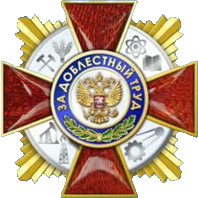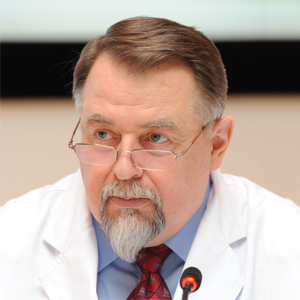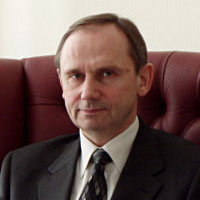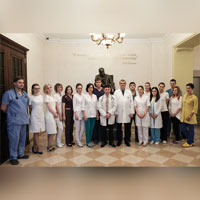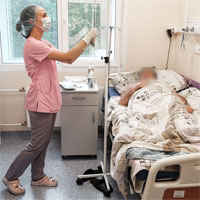Chief of the department: Melnichenko Vladimir Yaroslavovich, head of the academic department, M.D., professor, member of RANS.
The first chief of the department and the first chair of the academic department of hematology and cell therapy was Professor Novik Andrey Arkadievich
Andrey Arkadievich Novik was born on February 27, 1952 in Kharkov. After graduating with honors from the S.M. Kirov Military Medical Academy in Leningrad and service in the military unit, he returned to the department of faculty therapy of the Military Medical Academy, which in 1990 received the name of the Department of Hematology and Clinical Immunology. The whole of his subsequent multifaceted scientific, clinical and pedagogical activity was closely associated with the department for almost 25 years, where he passed from post-graduate student to the chief of the department. The main areas of clinical, scientific and pedagogical activity of Andrei Arkadievich were associated with various subspecialties of therapy: hematology, oncology, transplantology, clinical immunology, rheumatology, nephrology, hepatology, palliative medicine. Since 2003, Andrei Novik Arkadievich Novik has been working in the Pirogov National Medical and Surgical Center.
Since 2012, the department is headed by M.D., Ph.D., Professor Melnichenko Vladimir Yaroslavovich.
The department of hematology, chemotherapy and bone marrow transplantation has modern medical equipment that allows to complete full and rapid diagnosis of oncological diseases, blood system diseases and other pathological conditions of immune system. The equipment of the department allows providing both traditional therapy of diseases (chemotherapy, immunotherapy, combined methods of treatment) and treatment with the use of advanced medical technologies, including bone marrow transplantation. The department annually carries out more than 100 bone marrow transplantations on patients with various diseases of the blood system, as well as autoimmune diseases of the nervous system (multiple sclerosis), connective tissue (rheumatoid arthritis, systemic lupus erythematosus, systemic scleroderma) and digestive system pathologies (Crohn’s disease, ulcerative colitis).
The main directions of the department’s work are
Diagnostics of diseases of the blood system, malignant neoplasms.
Chemotherapy, high-dose chemotherapy, targeted therapy, immunotherapy for:
- Non-Hodgkin’s lymphomas;
- Lymphogranulomatosis (Hodgkin’s disease);
- Chronic lymphocytic leukemia;
- Acute leukemia;
- Myelodysplastic syndrome;
- Multiple myeloma;
- Trobocitemia;
- Polycythemia;
- Solid tumors (breast cancer, stomach cancer, colorectal cancer, lung cancer, etc.);
- Aplastic anemia and anemia of another nature.
Bone marrow transplantation (stem blood-forming cells) for:
- Non-Hodgkin’s lymphomas;
- Lymphogranulomatosis (Hodgkin’s disease);
- Multiple myeloma;
- Solid tumors;
- Autoimmune pathology of the nervous system, connective tissue and digestive organs.
Department of bone marrow transplantation is equipped in accordance with international standards:
- Aseptic boxes — separate chambers equipped with special air and water purification systems designed for bone marrow transplantation in a wide range of diseases (lymphomas, myeloma, leukemias, lymphogranulomatosis, etc.), treatment of patients with severe immune system disorders, which reduce the risk of infectious contamination patient with microorganisms;
- The water and air purification systems installed in the department of bone marrow and stem cell transplantation ensure a constant supply of sterile air and water and are an integral part of aseptic boxes;
- Cytapheresis systems — high-technology devices for collecting stem hemopoietic cells, red blood cells and other blood elements necessary for bone marrow and stem cell transplantation in a wide range of diseases.
Diseases
- Non-Hodgkin’s Lymphomas Lymphogranulomatosis (Hodgkin’s disease);
- Chronic lymphatic leukemia;
- Acute leukemia;
- Myelodysplastic syndrome;
- Multiple myeloma;
- Thrombocythemia;
- Polycythemia.
Contact Information
Address: 105203, Moscow, Nizhnyaya Pervomayskaya str., 70
Contact phone number:
Fax:
How to reach us by using public transport
“Pervomaiskaya” metro station (last carriage of the train out of the city centre). From “Pervomaiskaya” metro station by any tram or trolley bus go to the stop “15th Parkovaya Street”. Go along the 15th Park Street to the intersection with the Nizhnyaya Pervomaiskaya Street, turn left and walk about a hundred meters to the entrance of the Pirogov National Medical and Surgical Center.






